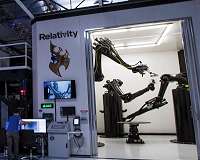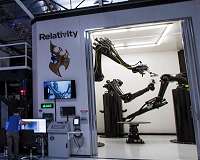Relativity Space, the first company to 3D print an entire rocket and build the largest metal 3D printers in the world, has announced it closed a $500 million Series D equity funding round. The round was led by Tiger Global Management with participation from new investors Fidelity Management and Research Company LLC, Baillie Gifford, ICONIQ Capital, General Catalyst, XN, Senator Investment Group, and Elad Gil. Existing investors participating in the round include BOND, Tribe Capital, K5 Global, 3L, Playground Global, Mark Cuban, Spencer Rascoff, and Allen and Company LLC, among others.
The Series D equity funding validates Relativity’s sector-leading momentum across commercial execution, technical milestones, and talent growth. The funding will enable Relativity to accelerate its planned initiatives, including its factory of the future, launch vehicle development, and 3D printing technologies as it builds toward humanity’s multiplanetary future.
“This past year drove change in every industry, including aerospace. Throughout 2020, Relativity achieved unprecedented growth, attracted top talent, and stepped up to deliver results we could have only imagined when we started the company less than five years ago,” shared Tim Ellis, Relativity’s co-founder and CEO.
“We are on track to launch our first Terran 1 rocket to orbit next year with existing capital on our balance sheet. With this new Series D funding, we will now dramatically accelerate the development of our long-term plans and look beyond first launch.”
Disrupting 60 years of aerospace, Relativity’s radically simplified supply chain enables the company to build its orbital rocket, Terran 1, with 100x fewer parts in less than 60 days. By fusing 3D printing, artificial intelligence, proprietary software, and autonomous robotics, Relativity’s team is creating an entirely new value chain for aerospace, starting with orbital launch.
Relativity is well on its way to launching the world’s first entirely 3D printed rocket to orbit, only the first step in a long-term vision to upgrade humanity’s industrial base on Earth and build one on Mars.
“Aerospace still relies on the same fundamental toolset it did 60 years ago when rockets were first launched to the Moon and global aviation was in full swing: giant factories full of fixed tooling, with complex supply chains and hundreds of thousands to millions of individual parts assembled one at a time by hand, using hundreds of diverse manufacturing processes,” shared Tim Ellis.
“What we are building at Relativity fundamentally rewrites that tech stack. At its heart, 3D printing is an automation technology, one that transforms physical complexity into software by stitching many components together.
“The compounding rate of improvement and iteration possible through our disruptive approach will be unlike anything seen before. If we are going to live on Mars, it is inevitable that this factory of the future must exist to build humanity’s industrial base once there. At Relativity, we look forward to furthering an iconic new technology to build the future of humanity in space, faster.”
In connection with the Series D financing, Allen and Company LLC served as Relativity Space’s financial advisor, and Fenwick and West LLP served as Relativity Space’s legal advisor.
Related Links
Relativity Space
Rocket Science News at Space-Travel.Com
|
Thanks for being there; We need your help. The SpaceDaily news network continues to grow but revenues have never been harder to maintain.With the rise of Ad Blockers, and Facebook – our traditional revenue sources via quality network advertising continues to decline. And unlike so many other news sites, we don’t have a paywall – with those annoying usernames and passwords.Our news coverage takes time and effort to publish 365 days a year.If you find our news sites informative and useful then please consider becoming a regular supporter or for now make a one off contribution. |
||
|
SpaceDaily Monthly Supporter $5+ Billed Monthly |
||
paypal only
SpaceDaily Contributor
$5 Billed Once
credit card or paypal
NASA’s ‘super cool’ engineers rehearse rocket fueling for Artemis I
Kennedy Space Center FL (SPX) Nov 22, 2020
NASA’s Space Launch System (SLS) rocket will propel the Orion spacecraft on a journey beyond the Moon and back to Earth during an uncrewed flight test known as Artemis I. Well before liftoff, a group of engineers will be inside the Launch Control Center at NASA’s Kennedy Space Center in Florida, where they will monitor the loading of cryogenic liquid hydrogen and liquid oxygen – super-cooled fuels – into the rocket.
To test this all-important tanking process, engineers from NASA’s Exploration Grou … read more
– Advertisement –


